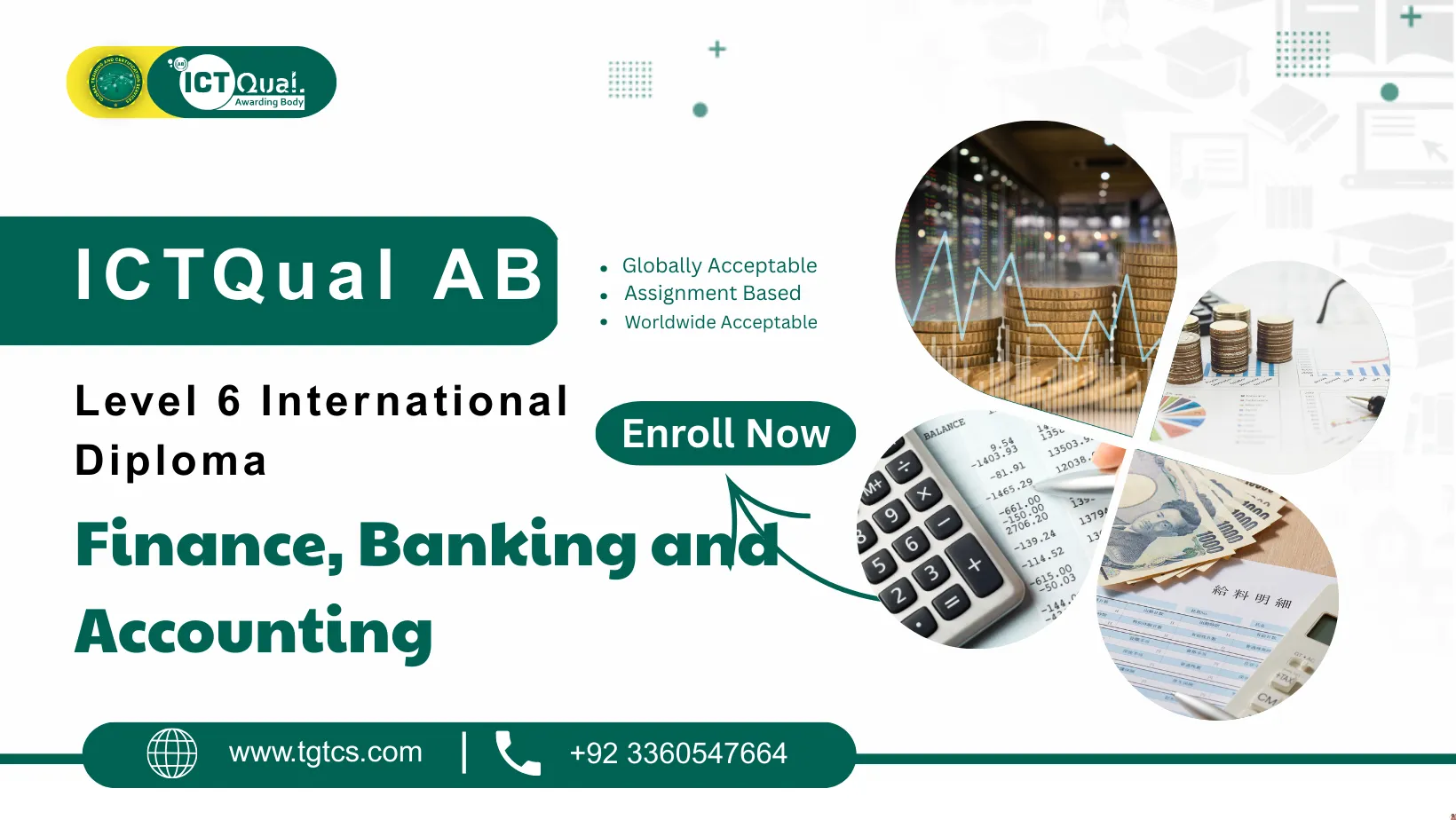ICTQual AB Level 6 International Diploma in Finance, Banking and Accounting
The ICTQual AB Level 6 International Diploma in Finance, Banking and Accounting is a prestigious qualification designed to prepare learners for leadership roles in today’s dynamic financial sector. In an era where global finance, investment strategies, and regulatory frameworks are rapidly evolving, this diploma provides the essential skills and knowledge required to succeed in banking, accounting, and financial management.
This internationally recognized diploma offers a comprehensive understanding of advanced finance principles, corporate accounting, global banking operations, and investment strategies. Learners will gain expertise in risk management, financial reporting, taxation, auditing, and compliance with international financial standards. The program also integrates practical applications such as financial analysis, portfolio management, and the use of digital technologies in modern banking.
The ICTQual AB Level 6 International Diploma in Finance, Banking and is assignment-based and flexible, making it suitable for working professionals, entrepreneurs, and graduates aspiring to advance in the finance and banking industry. With British Council verification, MOFA and Embassy attestation, it is globally trusted and highly regarded for career growth and iqama approval in Gulf countries.
Graduates of this diploma will be equipped with strong analytical skills, strategic decision-making abilities, and the capacity to manage financial operations effectively in multinational corporations, banks, investment firms, and government institutions. This makes the ICTQual AB Level 6 International Diploma in Finance, Banking and Accounting an ideal choice for those seeking global career opportunities in finance, banking, and accounting.
The Global Training and Certification Services is Approved Training Centre of ICTQual AB UK Ltd
Course Level and Credits
- Level 6 International Diploma, 360 credits.
- Suitable for finance professionals, bankers, accountants, entrepreneurs, and students seeking advanced international finance and banking knowledge.
Mode of Study
- Fully assignment-based; study at your own pace.
- Accessible globally, designed to be flexible for working professionals and fresh graduates.
Global Recognition & Attestation
- British Council verifiable, MOFA and Embassy attested.
- Internationally recognized for career advancement, job placements, and iqama approval in Gulf countries.
Scope and Purpose
- Comprehensive coverage of finance, banking operations, and accounting practices.
- Strong focus on international financial standards, investment strategies, and corporate compliance.
Skills and Knowledge Gained
- Expertise in financial management, corporate accounting, auditing, and taxation.
- Knowledge of risk management, banking regulations, financial reporting, and portfolio analysis.
- Practical applications in digital banking, global markets, and financial decision-making.
- Development of leadership, strategic planning, and problem-solving skills for financial institutions.
Career Benefits
- Opens opportunities in multinational banks, investment firms, auditing companies, and corporate finance departments.
- Enhances employability, professional credibility, and global career growth in finance and banking.
Target Audience
- Banking and finance professionals, accountants, auditors, entrepreneurs, and students aiming for careers in global finance and corporate accounting.
Unique Selling Points (USPs)
- Flexible self-paced study, fully assignment-based.
- Globally trusted and British Council verifiable qualification.
- MOFA and Embassy attested, ideal for job opportunities and iqama approval.
Mandatory Unit
This qualification, the ICTQual AB Level 6 International Diploma in Finance, Banking & Accounting, consists of 36 mandatory units.
Year 1 – Foundation in Finance, Banking & Accounting
- Introduction to Financial Accounting
- Principles of Banking Operations
- Business and Organisational Fundamentals
- Fundamentals of Economics
- Communication Skills for Finance Professionals
- Principles of Management and Leadership
- Introduction to Financial Markets
- Business Mathematics and Statistics
- Ethics and Professional Conduct in Finance
- Introduction to Corporate Finance
- Research Methods in Finance and Accounting
- Fundamentals of Taxation
Year 2 – Intermediate Finance, Banking & Accounting
- Financial Reporting and Analysis
- Management Accounting and Budgeting
- Banking Law and Regulatory Compliance
- Investment and Portfolio Management
- Corporate Governance and Risk Management
- International Finance and Trade
- Advanced Business Mathematics and Modelling
- Human Resource Management in Financial Institutions
- Auditing Principles and Practices
- Strategic Financial Management
- Financial Information Systems
- Professional Development and Reflective Practice
Year 3 – Advanced Finance, Banking & Accounting
- Advanced Corporate Finance
- Strategic Banking Operations
- Financial Planning and Forecasting
- International Accounting Standards
- Risk Assessment and Financial Controls
- Derivatives, Securities, and Investment Analysis
- Leadership in Financial Organisations
- Financial Analytics and Decision-Making
- Tax Planning and Compliance
- Mergers, Acquisitions, and Corporate Restructuring
- Research and Evidence-Based Practice in Finance
- Capstone Project in Finance, Banking & Accounting
The ICTQual AB Level 6 International Diploma in Finance, Banking equips learners with advanced expertise in financial management, banking operations, and global accounting practices.
Year 1 – Foundation in Finance, Banking & Accounting
Introduction to Financial Accounting
- Understand the principles of double-entry bookkeeping and financial statements.
- Develop basic accounting skills for recording business transactions.
- Apply accounting concepts to prepare income statements and balance sheets.
- Recognize the role of accounting in business decision-making.
Principles of Banking Operations
- Explain the functions and services of retail and commercial banks.
- Identify key processes in deposits, loans, and credit management.
- Understand the regulatory framework governing banking operations.
- Apply basic risk management principles in banking activities.
Business and Organisational Fundamentals
- Understand the structures and functions of business organizations.
- Explore organizational goals, strategies, and operational processes.
- Examine the role of leadership and teamwork in business success.
- Apply business fundamentals to real-world organizational settings.
Fundamentals of Economics
- Understand the principles of microeconomics and macroeconomics.
- Analyze supply, demand, and market equilibrium in economic systems.
- Explore the role of government policies in managing economies.
- Apply economic principles to banking and financial decision-making.
Communication Skills for Finance Professionals
- Develop effective written and verbal communication skills for finance.
- Prepare professional reports, memos, and financial presentations.
- Enhance negotiation and client communication techniques.
- Apply communication skills in cross-cultural financial settings.
Principles of Management and Leadership
- Understand key management theories and leadership styles.
- Explore planning, organizing, and controlling business functions.
- Apply leadership skills in financial and banking environments.
- Analyze case studies of effective management practices.
Introduction to Financial Markets
- Understand the structure and function of global financial markets.
- Explore the role of stock exchanges, bonds, and money markets.
- Identify major financial instruments and their applications.
- Evaluate the impact of financial markets on global economies.
Business Mathematics and Statistics
- Apply mathematical techniques in financial calculations.
- Use statistics to analyze financial data and trends.
- Solve problems using probability and regression analysis.
- Interpret data for informed business and financial decisions.
Ethics and Professional Conduct in Finance
- Understand the importance of ethics in finance and banking.
- Analyze ethical dilemmas in accounting and financial management.
- Apply professional codes of conduct in financial practice.
- Promote transparency and integrity in financial reporting.
Introduction to Corporate Finance
- Understand the goals and principles of corporate finance.
- Apply concepts of capital structure and cost of capital.
- Explore techniques for investment appraisal and project evaluation.
- Assess corporate financing options and dividend policies.
Research Methods in Finance and Accounting
- Understand the principles of academic and business research.
- Apply qualitative and quantitative research methods.
- Collect and analyze financial data for decision-making.
- Develop research skills for finance and accounting projects.
Fundamentals of Taxation
- Understand the principles of taxation and fiscal policy.
- Explore types of taxes applicable to individuals and corporations.
- Apply tax rules in preparing basic tax returns.
- Recognize the role of taxation in economic development.
Year 2 – Intermediate Finance, Banking & Accounting
Financial Reporting and Analysis
- Prepare and interpret financial statements for organizations.
- Analyze company performance using ratio analysis.
- Apply International Financial Reporting Standards (IFRS).
- Use financial reports for strategic decision-making.
Management Accounting and Budgeting
- Understand the role of management accounting in organizations.
- Prepare budgets and analyze variances.
- Apply costing methods for decision-making.
- Support strategic planning through management accounting tools.
Banking Law and Regulatory Compliance
- Understand key laws regulating banks and financial institutions.
- Explore compliance requirements in local and international banking.
- Apply principles of anti-money laundering (AML) and KYC.
- Evaluate the impact of regulation on banking operations.
Investment and Portfolio Management
- Understand the principles of investment planning and risk-return.
- Develop portfolio diversification strategies.
- Apply techniques in equity and bond investment analysis.
- Assess performance of investment portfolios.
Corporate Governance and Risk Management
- Understand principles of corporate governance frameworks.
- Identify risks in financial institutions and corporations.
- Apply risk assessment tools and mitigation strategies.
- Promote accountability and transparency in governance.
International Finance and Trade
- Explore principles of international trade and capital flows.
- Understand foreign exchange markets and currency risk.
- Analyze global financial markets and trade policies.
- Apply strategies for managing international financial operations.
Advanced Business Mathematics and Modelling
- Apply mathematical models to financial forecasting.
- Use linear programming and decision analysis.
- Interpret econometric models in financial decision-making.
- Apply quantitative tools to complex business problems.
Human Resource Management in Financial Institutions
- Understand HR strategies in banking and finance.
- Explore recruitment, training, and talent management.
- Apply performance management in financial organizations.
- Assess the role of HR in organizational success.
Auditing Principles and Practices
- Understand principles and objectives of auditing.
- Apply audit procedures to assess financial accuracy.
- Identify risks of fraud and error in financial statements.
- Evaluate internal control systems in organizations.
Strategic Financial Management
- Apply strategies for long-term financial planning.
- Understand mergers, acquisitions, and capital budgeting.
- Evaluate corporate financing and dividend decisions.
- Align financial management with corporate strategy.
Financial Information Systems
- Explore the role of technology in financial management.
- Apply financial software tools in decision-making.
- Understand security and data management in finance.
- Integrate IT systems with accounting and banking operations.
Professional Development and Reflective Practice
- Develop skills for lifelong learning in finance and banking.
- Apply reflective practice to professional growth.
- Assess personal strengths and areas for improvement.
- Build leadership and interpersonal skills.
Year 3 – Advanced Finance, Banking & Accounting
Advanced Corporate Finance
- Apply advanced techniques in capital budgeting.
- Analyze financial strategies for growth and expansion.
- Evaluate cost of capital and optimal capital structure.
- Assess dividend policies in multinational organizations.
Strategic Banking Operations
- Understand modern strategies in banking operations.
- Apply risk management techniques in banking systems.
- Explore digital banking and fintech innovations.
- Evaluate the impact of globalization on banking operations.
Financial Planning and Forecasting
- Prepare financial forecasts for organizations.
- Apply forecasting models and techniques.
- Evaluate the accuracy and limitations of financial forecasts.
- Support long-term decision-making with forecasting tools.
International Accounting Standards
- Apply International Financial Reporting Standards (IFRS).
- Understand convergence of accounting standards globally.
- Interpret consolidated financial statements.
- Assess compliance with global accounting regulations.
Risk Assessment and Financial Controls
- Identify financial risks in organizations.
- Apply internal controls to mitigate financial risks.
- Evaluate the effectiveness of control systems.
- Implement risk-based approaches in financial management.
Derivatives, Securities, and Investment Analysis
- Understand principles of derivatives and securities markets.
- Apply hedging strategies using futures and options.
- Analyze securities for investment decision-making.
- Assess risks and returns of derivative instruments.
Leadership in Financial Organisations
- Understand leadership theories in financial institutions.
- Apply leadership skills in organizational transformation.
- Build team effectiveness in finance environments.
- Lead ethically and strategically in financial organizations.
Financial Analytics and Decision-Making
- Apply data analytics in financial decision-making.
- Use predictive models for financial performance.
- Interpret large datasets using analytical tools.
- Make strategic decisions based on financial analytics.
Tax Planning and Compliance
- Understand principles of tax planning for businesses.
- Apply strategies to minimize tax liabilities legally.
- Assess compliance with international taxation rules.
- Evaluate the role of tax planning in corporate strategy.
Mergers, Acquisitions, and Corporate Restructuring
- Understand the principles of mergers and acquisitions.
- Evaluate financial and strategic implications of M&A.
- Apply valuation techniques for corporate restructuring.
- Assess risks and opportunities in M&A processes.
Research and Evidence-Based Practice in Finance
- Apply research methods to financial case studies.
- Analyze data to support evidence-based financial practices.
- Develop problem-solving approaches through research.
- Integrate research into financial decision-making.
Capstone Project in Finance, Banking & Accounting
- Design and execute a comprehensive research project.
- Apply advanced theories and practices in finance and banking.
- Solve real-world challenges in financial management.
- Present findings and recommendations in a professional format.
By the end of this diploma, learners will be fully equipped with advanced financial, banking, and accounting expertise, enabling them to make strategic decisions, manage complex financial operations, and excel in leadership roles within global financial institutions and corporate organizations.
The ICTQual AB Level 6 International Diploma in Finance, Banking and Accounting is designed to provide learners with advanced knowledge, practical skills, and global recognition to excel in financial services, banking operations, and accounting management.
Career Advancement Opportunities
- Gain a globally recognized qualification to boost employability in finance, banking, and accounting.
- Open pathways to senior-level roles in multinational corporations and financial institutions.
Practical and Professional Skills Development
- Acquire advanced knowledge in financial reporting, investment, taxation, and corporate finance.
- Strengthen decision-making, analytical, and risk management skills for real-world business environments.
Global Recognition and Credibility
- British Council verifiable, MOFA and Embassy attested for international credibility.
- Recognized in Gulf countries for employment and iqama approval.
Flexible Learning for Professionals
- Fully assignment-based study model, designed for working professionals and entrepreneurs.
- Study at your own pace from anywhere in the world with complete flexibility.
Strategic Knowledge and Application
- Master international banking laws, financial regulations, and global accounting standards.
- Apply theoretical concepts in practical scenarios through projects and case studies.
In conclusion, the ICTQual AB Level 6 International Diploma in Finance, Banking and Accounting empowers learners with specialized knowledge, professional credibility, and global opportunities. It is the ideal qualification for those seeking a successful and impactful career in finance, banking, and accounting.
The ICTQual AB Level 6 International Diploma in Finance, Banking and Accounting is tailored for ambitious learners who are eager to enhance their expertise and pursue successful careers in global finance, banking, and accounting.
Finance Professionals Seeking Career Growth
- Professionals already working in finance who want to progress into senior management roles.
- Individuals aiming to gain advanced knowledge in financial reporting, taxation, and corporate finance.
Aspiring Banking Specialists
- Learners interested in pursuing careers in retail, corporate, or investment banking.
- Professionals aiming to strengthen their expertise in banking operations, compliance, and international finance.
Accounting and Auditing Practitioners
- Accountants and auditors seeking a globally recognized qualification for professional credibility.
- Those who want to expand their skills in international accounting standards and auditing practices.
Entrepreneurs and Business Owners
- Entrepreneurs managing financial operations who want to gain structured knowledge of finance and banking.
- Business owners aiming to make informed financial decisions and improve business sustainability.
Graduates and Career Starters
- Recent graduates looking to build a strong foundation for a career in finance, banking, or accounting.
- Individuals preparing for global opportunities and professional advancement in the financial sector.
In summary, this diploma is designed for professionals, entrepreneurs, and students who want to gain advanced expertise, global recognition, and career opportunities in the fields of finance, banking, and accounting.
Course Overview
Course Level
Level 6
Course Units
36 Units
Credits
360
Duration
3 years






